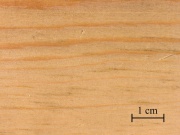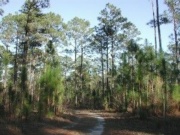Difference between revisions of "Longleaf pine"
| Line 4: | Line 4: | ||
== Description == | == Description == | ||
| − | A tall evergreen tree, ''Pinus palustris'', that grows in the southeastern United States. The longleaf pine, along with the slash pine, are the principal sources of [[turpentine (oil)|turpentine]]. It is obtained from the sapwood of living trees. Longleaf pine trees grow quickly and are used for about half of the [[kraft paper]], [[paperboard]], and [[book paper]] made in the United States. The hard, stiff, durable lumber was also used for ships, boxes, flooring, heavy construction, and millwork. Its highest production period for lumber was from 1850-1915. The | + | A tall evergreen tree, ''Pinus palustris'', that grows in the southeastern United States. The longleaf pine, along with the slash pine, are the principal sources of [[turpentine (oil)|turpentine]]. It is obtained from the sapwood of living trees. Longleaf pine trees grow quickly and are used for about half of the [[kraft paper]], [[paperboard]], and [[book paper]] made in the United States. The hard, stiff, durable lumber was also used for ships, boxes, flooring, heavy construction, and millwork. Its highest production period for lumber was from 1850-1915. The lumber is still commonly sold as lumber, often under the name of Southern pine. |
[[File:Longleafpinevt.jpg|thumb|Longleaf pine | [[File:Longleafpinevt.jpg|thumb|Longleaf pine | ||
Revision as of 12:46, 13 April 2020
Description
A tall evergreen tree, Pinus palustris, that grows in the southeastern United States. The longleaf pine, along with the slash pine, are the principal sources of turpentine. It is obtained from the sapwood of living trees. Longleaf pine trees grow quickly and are used for about half of the Kraft paper, Paperboard, and Book paper made in the United States. The hard, stiff, durable lumber was also used for ships, boxes, flooring, heavy construction, and millwork. Its highest production period for lumber was from 1850-1915. The lumber is still commonly sold as lumber, often under the name of Southern pine.
Synonyms and Related Terms
Pinus palustris; pitespaine (Port.); longleaf yellow pine; Georgia pine; hard pine; Southern pine; Virginian pine; brown pine
Working Properties
Wood from the longleaf pine is relatively hard for a softwood. Additionally the pitch of gum can collect on saw blades, requiring that they often be cleaned to inhibit burning. The wood also has a tendency to splinter and chip. The sap does not hinder adhesives, but knots should be sealed before painting to inhibit bleed-through. The wood stains well and can darken with age.
Chemical and Physical Properties
Grows to 30-35 m with straight trunk. Bark=thick, reddish-brown and scaly. Leaves-dark-green needles (20-45 cm) in bundles of three; often twisted. Cones:are yellow-brown in color, 15–25 cm long, and 5–7 cm broad, opening to 12 cm with a small, but sharp, downward-pointing spine on the middle of each scale.
| Density | 41 pcf |
|---|
Sources Checked for Data in Record
- Dictionary of Building Preservation, Ward Bucher, ed., John Wiley & Sons, Inc., New York City, 1996
- External source or communication Comment: Southern Pine Association, New Orleans, LA: air-dry weight = 41 pcf
- Wikipedia, the free encyclopedia, at http://www.wikipedia.com Comment: http://en.wikipedia.org/wiki/Longleaf_pine (Accessed Jan. 25, 2006)
- Van Nostrand's Scientific Encyclopedia, Douglas M. Considine (ed.), Van Nostrand Reinhold, New York, 1976
- Random House, Webster's Encyclopedic Unabridged Dictionary of the English Language, Grammercy Book, New York, 1997
- The American Heritage Dictionary or Encarta, via Microsoft Bookshelf 98, Microsoft Corp., 1998

